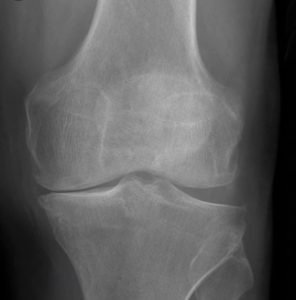For every step you take while walking, 3 pounds of force is applied on your knee joint. So for example, if you weigh 100 pounds, when you walk, every step places 300 pounds of force on your knee joint.
When you ride a bicycle you apply 3 pounds of force on your knee joint. Running places 10 pounds of force for every pound that you weigh on your knee joint. So that 100 pound person actually puts 1,000 pounds of force with every step they take while running.
If you are a runner and you have arthritic knees you should consider cross training for some of your run days. Running will just accelerate the arthritic process because of the amount of force being applied to the knee joint that already is unhealthy.
If you have arthritic knees and you are overweight, it will definitely help to lose weight. I get asked all the time from my patients, “How I am supposed to lose weight if I can’t exercise.”
Science has proven that most weight loss occurs through reduction of caloric intake and not through exercise.
I’d like to give the example if you can run an eight minute mile, which is pretty quick, you only burn about 87 calories. That is about half a piece of bread. So if you restrict your caloric intake, you will reduce your total calories quicker than with exercise. You would have to run about 4 miles, at an eight minute pace, to burn enough calories to eat a piece of chocolate cake. If you don’t eat the chocolate cake you are ahead by 4 miles so to speak without ever even going to the gym.
I like the saying that you lose weight in the kitchen and get fit in the gym. Daily exercise is extremely important. However, exercise is not the quickest way to achieve weight loss. It is important if you have arthritic knees to choose exercise that gives you a good cardio workout, keeps your muscles strong but does not put excessive amount of force on your knee joints.
So for every pound you can lose, you are helping to save your knee joints.



Recent Comments